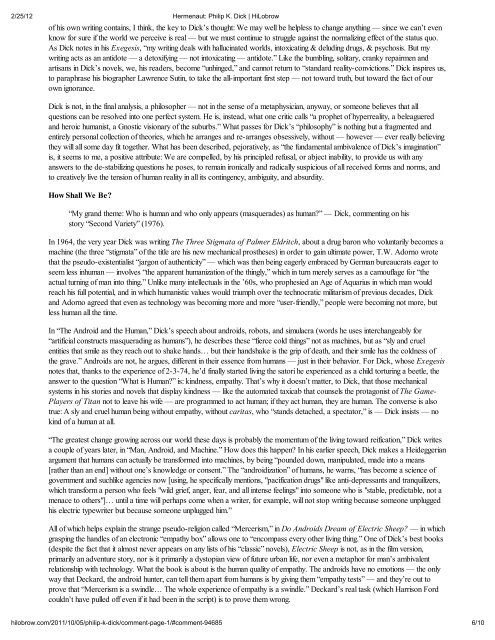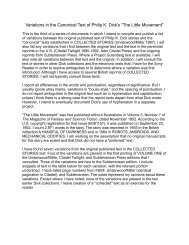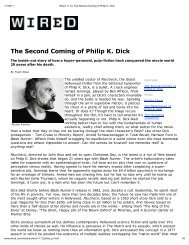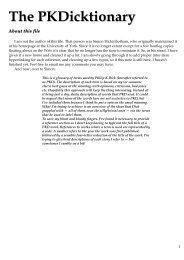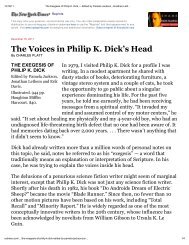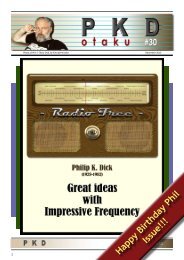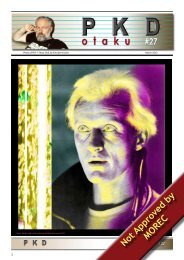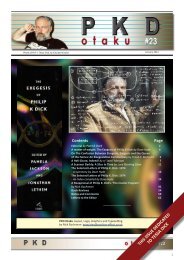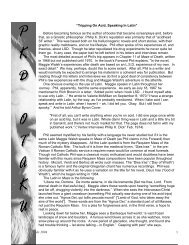Hermenaut - Philip K. Dick Fan Site
Hermenaut - Philip K. Dick Fan Site
Hermenaut - Philip K. Dick Fan Site
You also want an ePaper? Increase the reach of your titles
YUMPU automatically turns print PDFs into web optimized ePapers that Google loves.
2/25/12 <strong>Hermenaut</strong>: <strong>Philip</strong> K. <strong>Dick</strong> | HiLobrow<br />
of his own writing contains, I think, the key to <strong>Dick</strong>’s thought: We may well be helpless to change anything — since we can’t even<br />
know for sure if the world we perceive is real — but we must continue to struggle against the normalizing effect of the status quo.<br />
As <strong>Dick</strong> notes in his Exegesis, “my writing deals with hallucinated worlds, intoxicating & deluding drugs, & psychosis. But my<br />
writing acts as an antidote — a detoxifying — not intoxicating — antidote.” Like the bumbling, solitary, cranky repairmen and<br />
artisans in <strong>Dick</strong>’s novels, we, his readers, become “unhinged,” and cannot return to “standard reality-convictions.” <strong>Dick</strong> inspires us,<br />
to paraphrase his biographer Lawrence Sutin, to take the all-important first step — not toward truth, but toward the fact of our<br />
own ignorance.<br />
<strong>Dick</strong> is not, in the final analysis, a philosopher — not in the sense of a metaphysician, anyway, or someone believes that all<br />
questions can be resolved into one perfect system. He is, instead, what one critic calls “a prophet of hyperreality, a beleaguered<br />
and heroic humanist, a Gnostic visionary of the suburbs.” What passes for <strong>Dick</strong>’s “philosophy” is nothing but a fragmented and<br />
entirely personal collection of theories, which he arranges and re-arranges obsessively, without — however — ever really believing<br />
they will all some day fit together. What has been described, pejoratively, as “the fundamental ambivalence of <strong>Dick</strong>’s imagination”<br />
is, it seems to me, a positive attribute: We are compelled, by his principled refusal, or abject inability, to provide us with any<br />
answers to the de-stabilizing questions he poses, to remain ironically and radically suspicious of all received forms and norms, and<br />
to creatively live the tension of human reality in all its contingency, ambiguity, and absurdity.<br />
How Shall We Be?<br />
“My grand theme: Who is human and who only appears (masquerades) as human?” — <strong>Dick</strong>, commenting on his<br />
story “Second Variety” (1976).<br />
In 1964, the very year <strong>Dick</strong> was writing The Three Stigmata of Palmer Eldritch, about a drug baron who voluntarily becomes a<br />
machine (the three “stigmata” of the title are his new mechanical prostheses) in order to gain ultimate power, T.W. Adorno wrote<br />
that the pseudo-existentialist “jargon of authenticity” — which was then being eagerly embraced by German bureaucrats eager to<br />
seem less inhuman — involves “the apparent humanization of the thingly,” which in turn merely serves as a camouflage for “the<br />
actual turning of man into thing.” Unlike many intellectuals in the ’60s, who prophesied an Age of Aquarius in which man would<br />
reach his full potential, and in which humanistic values would triumph over the technocratic militarism of previous decades, <strong>Dick</strong><br />
and Adorno agreed that even as technology was becoming more and more “user-friendly,” people were becoming not more, but<br />
less human all the time.<br />
In “The Android and the Human,” <strong>Dick</strong>’s speech about androids, robots, and simulacra (words he uses interchangeably for<br />
“artificial constructs masquerading as humans”), he describes these “fierce cold things” not as machines, but as “sly and cruel<br />
entities that smile as they reach out to shake hands… but their handshake is the grip of death, and their smile has the coldness of<br />
the grave.” Androids are not, he argues, different in their essence from humans — just in their behavior. For <strong>Dick</strong>, whose Exegesis<br />
notes that, thanks to the experience of 2-3-74, he’d finally started living the satori he experienced as a child torturing a beetle, the<br />
answer to the question “What is Human?” is: kindness, empathy. That’s why it doesn’t matter, to <strong>Dick</strong>, that those mechanical<br />
systems in his stories and novels that display kindness — like the automated taxicab that counsels the protagonist of The Game-<br />
Players of Titan not to leave his wife — are programmed to act human; if they act human, they are human. The converse is also<br />
true: A sly and cruel human being without empathy, without caritas, who “stands detached, a spectator,” is — <strong>Dick</strong> insists — no<br />
kind of a human at all.<br />
“The greatest change growing across our world these days is probably the momentum of the living toward reification,” <strong>Dick</strong> writes<br />
a couple of years later, in “Man, Android, and Machine.” How does this happen? In his earlier speech, <strong>Dick</strong> makes a Heideggerian<br />
argument that humans can actually be transformed into machines, by being “pounded down, manipulated, made into a means<br />
[rather than an end] without one’s knowledge or consent.” The “androidization” of humans, he warns, “has become a science of<br />
government and suchlike agencies now [using, he specifically mentions, "pacification drugs" like anti-depressants and tranquilizers,<br />
which transform a person who feels "wild grief, anger, fear, and all intense feelings" into someone who is "stable, predictable, not a<br />
menace to others"]… until a time will perhaps come when a writer, for example, will not stop writing because someone unplugged<br />
his electric typewriter but because someone unplugged him.”<br />
All of which helps explain the strange pseudo-religion called “Mercerism,” in Do Androids Dream of Electric Sheep? — in which<br />
grasping the handles of an electronic “empathy box” allows one to “encompass every other living thing.” One of <strong>Dick</strong>’s best books<br />
(despite the fact that it almost never appears on any lists of his “classic” novels), Electric Sheep is not, as in the film version,<br />
primarily an adventure story, nor is it primarily a dystopian view of future urban life, nor even a metaphor for man’s ambivalent<br />
relationship with technology. What the book is about is the human quality of empathy. The androids have no emotions — the only<br />
way that Deckard, the android hunter, can tell them apart from humans is by giving them “empathy tests” — and they’re out to<br />
prove that “Mercerism is a swindle… The whole experience of empathy is a swindle.” Deckard’s real task (which Harrison Ford<br />
couldn’t have pulled off even if it had been in the script) is to prove them wrong.<br />
hilobrow.com/2011/10/05/philip-k-dick/comment-page-1/#comment-94685<br />
6/10


